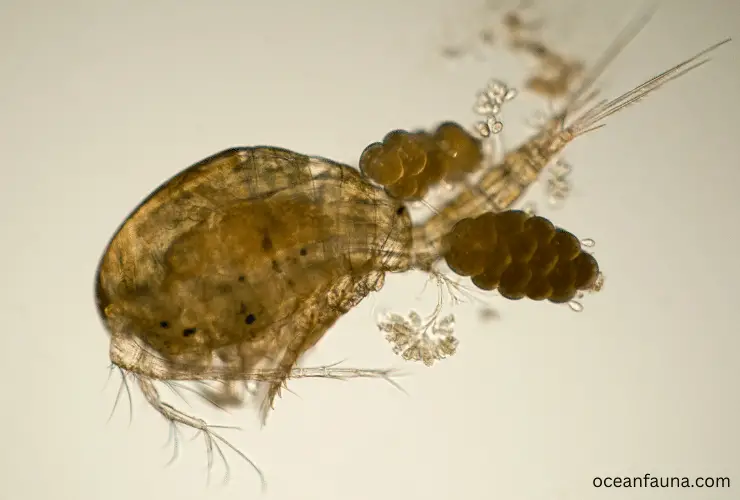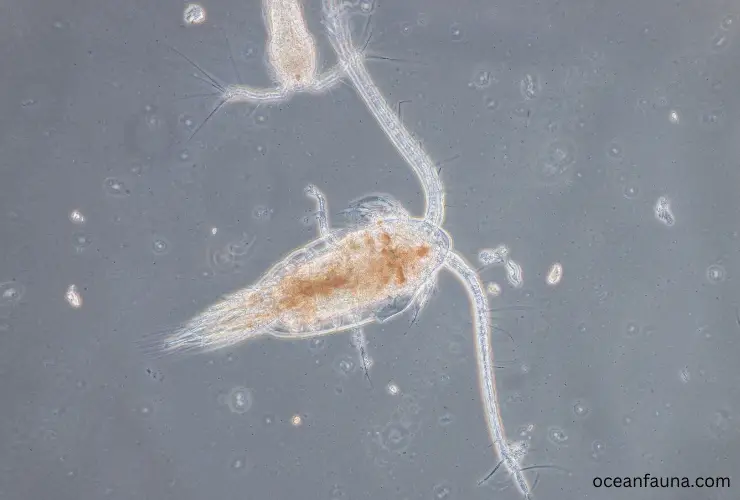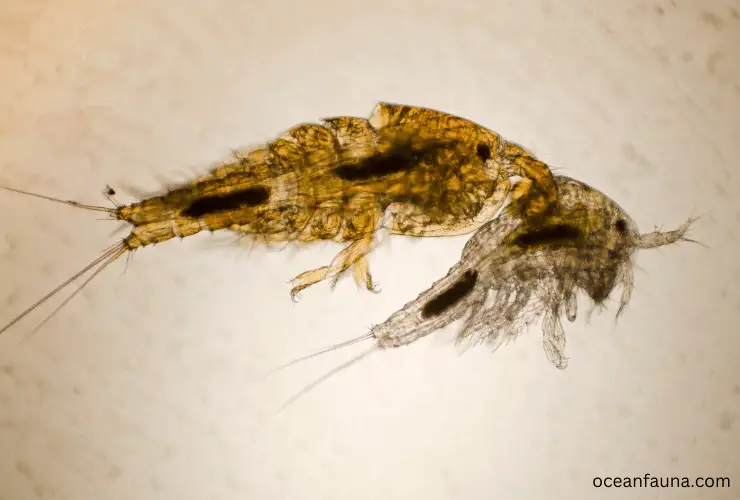Copepods are known to be generally herbivorous animals. However, some scientists have recently begun to realize that some copepods are actually omnivorous. It’s not about the species; it’s actually about their habitat.
Want to know more? This article will tell you in detail whether copepods are herbivores, carnivores, or omnivores and also discuss what copepods eat and how.
Are Copepods Herbivores?
Generally, copepods are categorized as herbivores due to their similarity with other zooplankton. They play an important role in the food chain as they are one of the most significant herbivores in sea creature populations.
Most of them eat phytoplankton (The reason they are called cow of the sea), though this does not give them the title of ‘herbivore.’ Rather, it is because they use a ‘fling and clap’ mechanism to filter phytoplankton. This means that they catch the plants before squeezing clean water out through tiny meshes on their limbs.
So, copepods are definitely there if you are making a list of sea herbivore creatures.
Are Copepods Carnivores?
Depending upon the habitat, sometimes copepods turn into carnivores. Also, some species have evolved to be carnivores, and their forelimbs are equipped with spines so that they can consume other copepods.

While echinoderms are not carnivores in the typical sense, such as cats or wolves, their bodies indicate that they feed primarily on plant material. Due to their specialized anatomy, they can also digest small creatures like tiny larvae or copepods.
Are Copepods Omnivores?
Yes, copepods can be categorized as omnivores when they alternate between eating plants and animals, depending upon the food availability. Scientists have recently started to believe that some species in certain habitats are omnivorous due to their diet.
The type of food that copepods eat depends upon the availability and is believed to be a result of adaptation, which allows them to consume both plant and animal material in order to survive.
What Does a Copepod Eat?
So, you know that copepods are habitually herbivores, but they can easily turn into carnivores or omnivores based on the place. So, now it’s time to discover what copepods eat. Do copepods eat phytoplankton? What about other fish? Do copepods eat bacteria? There are so many other questions to be answered.
Also See: What Eats Copepods? Copepods as Prey
Ecologically, copepods mostly eat phytoplankton. An individual copepod can consume about 400,000 phytoplankton in a single day. They risk not meeting their nutritional demands if they don’t consume the recommended daily allowance.
Now, do copepods eat dinoflagellates and diatoms? Yes, a recent scientific study found that copepods eat dinoflagellates, diatoms (more frequently called algae or microalgae), and microzooplankton. The reason is that many copepods can switch their diet from plants to meat.
They also eat bacteria, protozoans, and other particles found in the water. Copepods can also be predators; they feed on smaller copepods, eggs of invertebrates, and small crustaceans.
However, the food choices may vary from place to place. For example, the main food for Candacia bradyi copepods is Chaetognaths, but in the lab investigation, they are fed Artemia Nauplii. Other possible foods include copepod nauplii, Anchovy larvae, and mosquito larvae.

How Do Copepods Eat?
Copepods have a pair of antennae used to detect food and swim toward it. They capture the food with their third maxillae, a mouthpart with hooks at the end. After creating a pouch out of their fourth pair of legs, they draw the food inside where it can be digested. Copepods that eat other copepods use their spines to capture and tear them apart before consuming them.
Also, you should know that, as per the study, herbivores that consume sea plants are commonly found in cooler environments that have more productivity. On the other hand, Carnivorous copepods tend to reside in tropical areas with low amounts of food. Although the surroundings may be different, eating styles are not.
FAQs
What should I feed my copepods?
You can feed your copepods meaty items that decompose rapidly in the surrounding water. To get the best results, use a pestle and mortar to grind together some marine pellets with marine flake fish meals. Additionally, if you have a 2-liter plastic water bottle, you can grow phytoplankton to feed to your copepods.
How do copepods avoid predators?
As a defense mechanism against fish and other predators, copepods are able to make high-velocity leaps away from danger. These progressive escape jumps occur often and can generate velocities of as much as 800 mm s-1 and maximum acceleration of as high as 200 m s-2.
How long can copepods live without food?
Research says copepods had a maximum lifespan of 4 days when starved, 18 days if fed a low concentration of clean phytoplankton (0.6 µg C d−1), and around 32 days if fed an average concentration of phytoplankton (2.38 µg C d−1).
Where are copepods in the food chain?
The copepod is a vital component of the ‘traditional’ food chain. They are among the most important secondary producers throughout the ocean. Where they serve mostly as herbivores, mediating between primary producers like phytoplankton and higher trophic chains. Copepods are a major feeding source for many fish species.
Conclusion
So, copepods are mostly herbivores, but their diet can be carnivorous or omnivorous, depending on the availability of food. Phytoplankton, dinoflagellates, diatoms, bacteria, protozoans, and other particles found in water usually make up the copepod’s diet.
Furthermore, they can act as predators by consuming smaller copepods, invertebrate eggs, and tiny crustaceans. Hopefully, now you have a better understanding of the diet of copepods and the methods they use to capture and consume their food.


1 thought on “Are Copepods Herbivores? What Do Copepods Eat?”